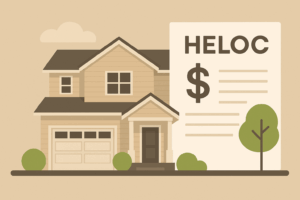How a HELOC Affects Your Home’s Resale Value?
When selling a home, there are countless factors to consider. The property’s location, condition, and age play crucial roles in determining its resale value. However, one factor that many homeowners overlook is the impact of a Home Equity Line of Credit on the future sale of their property.
A HELOC works by allowing homeowners to borrow against the equity in their home. It provides flexibility in borrowing and repayment, offering a revolving line of credit, much like a credit card. So, how can it impact your home’s resale value? Let’s explore.
Understanding the Debt Implications
The most significant factor when selling a home is the debt tied to it. This line of credit is secured by your house, which means that if it’s not fully repaid, it will remain a lien on the property. Such a lien can complicate the transaction, as potential buyers will likely be concerned about any additional debts attached to the property.
If the HELOC has been paid off before the house is listed, it’s a different story. In this case, the property’s value remains largely unaffected, and the sale process will likely go smoothly. So, while it doesn’t always have to be a dealbreaker, managing the balance appropriately is crucial if resale value is a concern.
Home Improvements and Value Enhancement
Many homeowners use it to fund home improvements, from kitchen remodels to new roofing. These updates can add significant value to a home, boosting its resale price. However, not all improvements are created equal. On the other hand, upgrading a kitchen or bathroom with modern, appealing features is often a good bet for increasing the appeal and value.
Renovations that align with current market trends and buyers’ preferences are more likely to result in a higher resale value. For example, homes with updated energy-efficient appliances or enhanced curb appeal tend to sell faster and for more money. If your home has benefited from these improvements, it might strengthen the property’s resale potential rather than hinder it.
Buyer Perceptions and Market Conditions
Market conditions play a significant role in how home equity can affect a home’s resale value. In a seller’s market, where demand outstrips supply, buyers may be more willing to overlook any outstanding liens or debts tied to the property. In contrast, a buyer’s market, characterized by abundant inventory, could mean that buyers are more cautious and less inclined to deal with a home with outstanding obligations.
The perception can then vary depending on broader market conditions. In a competitive market, buyers may prioritize other home features, such as its size or location, over its debt. Sellers should consider market trends when deciding whether to take out and plan their sale accordingly.
The Role of the Lender
When selling a house, the balance must be paid off before the transaction can close. The lender must clear the remaining debt before the property changes hands. This process can sometimes cause delays or complications during the sale.
Sellers must know this and plan accordingly to ensure the sale proceeds smoothly. Sometimes, working with a trusted company like Amerisave can help streamline the process. Partnering with a reliable lender can simplify repayment and facilitate a quicker, hassle-free sale.
A HELOC can significantly impact your home’s resale value, depending on how it’s managed. So, carefully weigh the pros and cons before deciding to use your home’s equity. The debt may reduce the attractiveness of the house for prospective buyers if not used wisely. Understanding these factors can help owners make informed decisions and understand their impact on their property.


